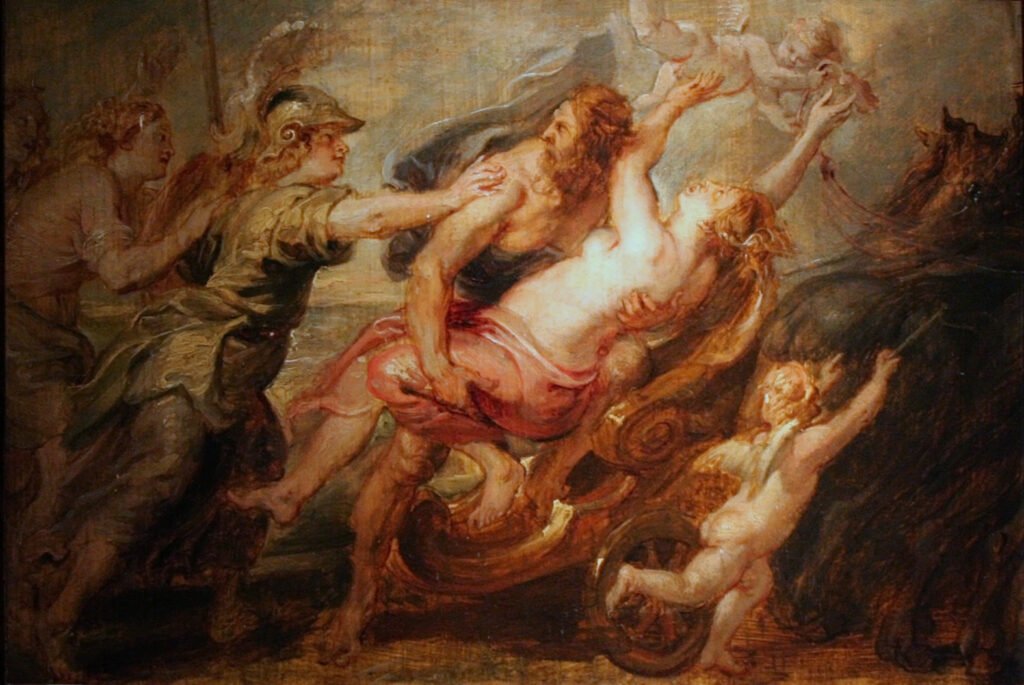Greek mythology is replete with tales of gods and goddesses, their epic battles, and their timeless love affairs. One such story that continues to fascinate and provoke curiosity is the myth of Zeus and Persephone. Zeus, the mighty king of the gods and ruler of the universe, seduced Persephone, the daughter of Demeter, without her mother’s knowledge. This article delves deep into this myth, exploring Zeus’ insatiable lust for power, the abduction of Persephone, and the lasting implications of their union.
The Myth of Zeus and Persephone
The myth of Zeus and Persephone revolves around the powerful god Zeus and his tempestuous relationship with Persephone, daughter of Demeter. Zeus, known for his shrewdness and charisma, was revered by both gods and mortals alike. As the king of gods, he held immense power and influence over the universe.
Zeus and His Lust for Power
Zeus’ hunger for power was insatiable, and he was notorious for seeking unconventional ways to fulfill his desires. Numerous Greek myths depict Zeus engaging in extra-marital affairs and relationships, using his authority to pursue what he perceived as his rightful entitlement.
For instance, Zeus’ affair with Persephone was not an isolated incident. He had numerous relationships outside of his marriage to Hera, his queen. These relationships often resulted in dire consequences for both mortals and gods involved. The impact of Zeus’ actions on his mythological counterparts cannot be understated.
The Abduction of Persephone
The abduction of Persephone is a significant event in the myth of Zeus and Persephone. Zeus, captivated by Persephone’s beauty and allure, made the daring and audacious decision to take her as a lover, albeit without her mother’s consent.
While the motivations behind Zeus’ actions may seem multifaceted and complex, his desire for power and control undoubtedly played a pivotal role. By abducting Persephone, Zeus cemented his dominance and exerted control over both Demeter and Persephone, manipulating the power dynamics within the pantheon of gods.
The Role of Persephone in the Myth
Persephone’s character holds significant importance in Greek mythology. As the daughter of Demeter, the goddess of agriculture and fertility, Persephone embodies the delicate balance between life and death, light and darkness.
The consequences of Persephone’s abduction are far-reaching. Persephone, now the queen of the underworld, assumes a new role and acquires a new identity, forever tied to Hades, the god of the underworld. This transformation has profound implications for the changing of seasons and the cyclical nature of life.
Interpretations and Analysis
The myth of Zeus and Persephone has been the subject of various interpretations and theories over the centuries.
One interpretation suggests that the myth symbolizes the struggle for power and control in both personal and societal realms. Zeus’ actions represent the desire for dominance and the consequences that follow such pursuits.
Another interpretation explores psychological aspects, viewing the myth as a reflection of Zeus’ subconscious desires or as an archetype representing the divine masculine. This interpretation focuses on the depths of human psychology and the primal urges that govern our actions.
Additionally, metaphorical interpretations present the myth as a representation of the balance between light and darkness, life and death. The union of Zeus and Persephone embodies the inevitable harmony and discord between opposing forces in the natural world.
Understanding the cultural and historical context in which myths were created is essential. Greek mythology, deeply rooted in ancient Greek society, often served as a vessel for conveying moral lessons and societal norms.
Perspectives from Greek Mythology
The myth of Zeus and Persephone does not exist in isolation. It is intertwined with numerous other myths involving Zeus and his complex relationships with gods and mortals.
Comparing and contrasting these myths can provide valuable insights into Zeus’ actions and the power dynamics inherent in his relationships. Moreover, understanding the values and beliefs of ancient Greek society provides a lens through which we can interpret and analyze the myth.
Zeus’ relationships with other mythological figures further exemplify his roles as the king of gods, the enforcer of justice, and the ruler of the universe.
The Legacy of the Myth
The myth of Zeus and Persephone has left an indelible mark on art, literature, and popular culture throughout history. Its enduring appeal can be attributed to the timeless themes it explores.
Artistic representations and adaptations of the myth can be found in ancient works such as pottery, sculptures, and frescoes. Artists from ancient to contemporary times have drawn inspiration from this captivating tale, immortalizing it through their creative expressions.
The myth carries profound lessons and themes that resonate with audiences across generations. It prompts introspection into the consequences of unchecked desire, the delicate balance of power within relationships, and the cyclical nature of life and death.
Conclusion
The myth of Zeus and Persephone provides a captivating glimpse into the complexities of Greek mythology. Through the lens of Zeus’ insatiable desire for power, the abduction of Persephone, and the lasting implications of their union, we gain a deeper understanding of the motives and dynamics at play in the ancient Greek world.
Exploring this myth reveals the layers of symbolism and rich metaphorical interpretations that continue to captivate scholars, artists, and enthusiasts today. It serves as a testament to the enduring power of ancient myths and the insights they offer into the human psyche.
As we delve further into the realm of Greek mythology, we are encouraged to uncover more hidden truths and undertake a comprehensive analysis of these captivating tales.
